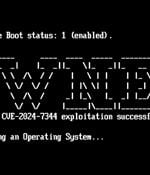Security News

Microsoft has fixed a known issue preventing Linux from booting on dual-boot systems with Secure Boot enabled after installing the August 2024 Windows security updates. [...]

Microsoft used its AI-powered Security Copilot to discover 20 previously unknown vulnerabilities in the GRUB2, U-Boot, and Barebox open-source bootloaders. [...]

Microsoft has rolled out quick machine recovery, a new Windows feature aimed at preventing prolonged widespread outages like the one caused by a faulty CrowdStrike update in July 2024. The goal of...

Microsoft has begun testing a new Windows 11 tool called Quick Machine Recovery, which is designed to remotely deploy fixes for buggy drivers and configurations that prevent the operating system...

Microsoft has fixed a known issue causing "boot device inaccessible" errors during startup on some Windows Server 2025 systems using iSCSI. [...]

Zyxel is warning that a bad security signature update is causing critical errors for USG FLEX or ATP Series firewalls, including putting the device into a boot loop. [...]

An exhaustive evaluation of three firewall models from Palo Alto Networks has uncovered a host of known security flaws impacting the devices' firmware as well as misconfigured security features....

Microsoft has fixed a bug that was causing some Windows Server 2022 systems with two or more NUMA nodes to fail to start up. [...]

A new UEFI Secure Boot bypass vulnerability tracked as CVE-2024-7344 that affects a Microsoft-signed application could be exploited to deploy bootkits even if Secure Boot protection is active. [...]

Details have emerged about a now-patched security vulnerability that could allow a bypass of the Secure Boot mechanism in Unified Extensible Firmware Interface (UEFI) systems. The vulnerability,...